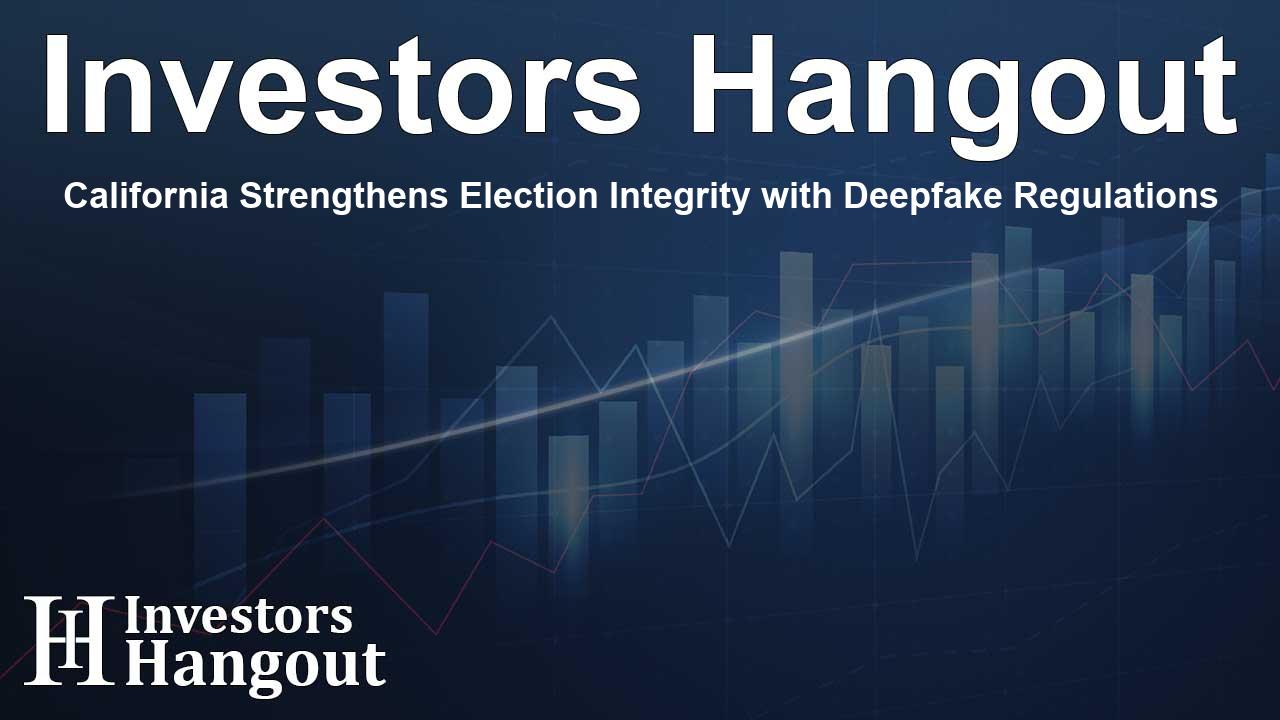California Strengthens Election Integrity with Deepfake Regulations

California's Commitment to Election Integrity
In a decisive move, California Governor Gavin Newsom has signed three significant bills targeting the growing concern of deepfakes in political advertisements. These new laws are set to fortify the integrity of elections by curbing the misuse of artificial intelligence (AI) to create deceptive images or videos that could mislead voters.
Overview of the New Laws
Starting immediately, the legislation bans the creation and dissemination of deepfakes specifically related to elections, enforcing this prohibition 120 days before the Election Day and continuing for 60 days afterward. Such legal action empowers the courts to halt the distribution of misleading materials and impose civil penalties for violations.
The Importance of Trust in Democracy
Governor Newsom emphasized the necessity of protecting the integrity of elections, stating, "Safeguarding the integrity of elections is essential to democracy, and it's critical that we ensure AI is not deployed to undermine the public's trust through disinformation, especially in today's fraught political climate." This underscores a broader initiative to maintain transparency and accountability in political communication.
The Role of Social Media Platforms
Large platforms such as Elon Musk's X, Meta's Facebook and Instagram, along with ByteDance's TikTok, will now have a legal obligation to remove any deceptive content from their sites. This step is vital in reducing the spread of disinformation and restoring public confidence in digital information, particularly during election cycles.
Disclosure Requirements for Political Campaigns
In a bid to promote transparency, political campaigns must openly disclose if they are utilizing materials that have been altered by AI in their advertisements. This regulation ensures that voters are informed about the authenticity of the content presented to them.
Recent Developments in Election Legislation
The enactment of these laws coincides with recent federal legislative efforts aimed at tackling election misinformation. Proposed measures would empower the Federal Election Commission to regulate the use of AI within electoral contexts, further strengthening the framework against deepfakes.
Concerns About AI and Deepfakes
The growing prevalence of AI-generated deepfakes has raised alarms among various stakeholders. A study by Google’s DeepMind highlighted that deepfakes of public figures are more commonplace than cyber attack attempts that utilize AI. This emphasizes the urgent need for regulations to counteract the misuse of technology that threatens electoral integrity.
Implications of Deepfake Technologies
Earlier in the year, AI tools developed by OpenAI and Microsoft were reported to be associated with the dissemination of election-related misinformation. This situation came to a head when deepfake attacks targeted high-profile figures including celebrities and politicians, causing substantial concern among government officials.
International Warnings and Observations
Similar issues are not limited to the United States; reports have indicated that the U.K. is also facing potential AI misinformation threats ahead of its upcoming polls. These global trends make it crucial for countries to take preemptive measures against the potential chaos that AI-generated misinformation could inflict on democratic processes.
Conclusion: The Path Forward
The introduction of these laws marks a significant step in protecting democratic values in California and sets a precedent that could influence other states. The commitment to transparency and accountability is essential as society navigates the complexities of modern digital communication. With these measures in place, California aims to help ensure a trustworthy electoral process for its citizens.
Frequently Asked Questions
What are the key provisions of the new deepfake laws?
The laws prohibit the creation and distribution of deepfakes related to elections 120 days before and 60 days after Election Day.
Who is affected by these new regulations?
Political campaigns and major social media platforms will need to comply with these regulations to ensure the integrity of election-related content.
Why are these laws important?
They help safeguard the integrity of elections and maintain public trust by regulating the use of AI in political advertising.
How will these laws be enforced?
Courts will have the authority to halt the distribution of misleading materials and impose civil penalties on offenders.
Can these regulations influence other states?
Yes, California's actions may serve as a model for other states considering similar legislation to combat misinformation in elections.
About Investors Hangout
Investors Hangout is a leading online stock forum for financial discussion and learning, offering a wide range of free tools and resources. It draws in traders of all levels, who exchange market knowledge, investigate trading tactics, and keep an eye on industry developments in real time. Featuring financial articles, stock message boards, quotes, charts, company profiles, and live news updates. Through cooperative learning and a wealth of informational resources, it helps users from novices creating their first portfolios to experts honing their techniques. Join Investors Hangout today: https://investorshangout.com/
Disclaimer: The content of this article is solely for general informational purposes only; it does not represent legal, financial, or investment advice. Investors Hangout does not offer financial advice; the author is not a licensed financial advisor. Consult a qualified advisor before making any financial or investment decisions based on this article. The author's interpretation of publicly available data shapes the opinions presented here; as a result, they should not be taken as advice to purchase, sell, or hold any securities mentioned or any other investments. The author does not guarantee the accuracy, completeness, or timeliness of any material, providing it "as is." Information and market conditions may change; past performance is not indicative of future outcomes. If any of the material offered here is inaccurate, please contact us for corrections.